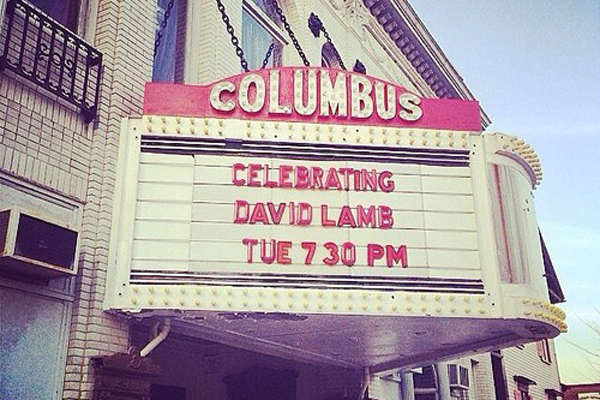The Boston Globe, April 10 2014 • James Reed

PROVIDENCE —It was not the kind of celebration anyone had in mind. It was supposed to be about looking forward, a chance to salute the years of good health and good music yet to come. All recent signs had suggested that Dave Lamb, who co-anchored the indie-folk duo Brown Bird, was on the mend after a nearly year long battle with leukemia.
Not even a month ago, Lamb and MorganEve Swain, his wife and better half in Brown Bird, had recorded demos at home for a new album they had planned to start making this month. They got married in August, and they were plotting their first round of comeback shows after being off the road for what seemed like an eternity for such road warriors. Suddenly, though, Lamb wasn’t feeling well again. He died last Saturday, his talent and potential snuffed out far too soon at age 36 (not 35, as previously reported).
Yet somehow Tuesday night’s “Celebrating David Lamb” at the Columbus Theatre here was a joyous event that honored not only Brown Bird’s legacy, but also the power of love and community. Brown Bird was based in Warren, R.I., and Providence had been a fiercely loyal home base for them.
“It was mostly relief that I felt throughout the evening,” Tom Weyman, Brown Bird’s manager, said the next day. “I wanted to make sure we did it right, and I think we did.” Weyman estimated that nearly a thousand people passed through the Columbus during the ceremony, including the families of both Lamb and Swain, members of several local bands, and luminaries from the music world including Jay Sweet and part of his team from Newport Folk Festival. Just before the theater opened its doors to the public for the free concert, a private memorial service took place at the theater with about 275 friends and family.
The event came together fast, spearheaded by Swain and Weyman. Swain personally picked four bands, all of whom had come up together in Providence, which had inspired Lamb to “strive to be a better musician than he already was.” It was easy to see why she chose them, too; you could pick out influences that were also prevalent in Brown Bird’s music, which was a muscular mix of folk, country, blues, and global rhythms.
Even before the three-hour ceremony began, there was a palpable sense of mourning. An hour ahead of showtime, a long line snaked outside the venue for a full block, with musicians such as Dan Blakeslee and Vudu Sister covering Brown Bird songs in front of the crowd. A few blocks away, White Electric Coffee, a popular cafe, was playing Brown Bird’s music on the house stereo. “It’s so sad but we thought it would be a nice tribute,” the woman at the counter said.
At least on stage, uplift prevailed over the grief that surely had engulfed everyone who got up to perform. Swain appeared early on, holding her head high and visibly overwhelmed by the magnitude of the audience and the standing ovation it gave her. “Um, thanks?” she said as the applause died down. She thanked everyone for coming and turned the night back over to the music.
Last Good Tooth, who were on tour with Brown Bird last year when Lamb was diagnosed, had a barroom swagger suited for last call. Alec K. Redfearn & the Eyesores cast a spell with their swirling, whirling melodies that conjured the same circus-like frenzy and Eastern European elements that often cropped up in Brown Bird’s songs. On the softer side, Death Vessel cut a pastoral presence buoyed by the mellifluous voice of frontman Joel Thibodeau and the band’s sumptuous harmonies and chamber-folk arrangements.
In the closing set, it was Joe Fletcher, a longtime friend of Lamb and Swain, who came closest to summoning the force and vitality that Brown Bird unleashed onstage and on their recordings. Backed by his honky-tonk band, the Wrong Reasons, Fletcher struck an elegiac note by opening with “Passing Through,” a folk standard whose message got to the heart of why everyone had gathered: “Passing through, passing through/Sometimes happy, sometimes blue/ Glad I ran into you.”
Fletcher later assembled nearly 20 musicians onstage for rousing singalongs of Tom Waits’s “Come on Up to the House” and Brown Bird’s “Mabel Grey.” With her arms draped around her friends and getting hugs from both sides, Swain managed to smile as she sang and swayed along.
As the musicians dispersed, one of Lamb’s childhood friends, James Orbison, appeared and called for a minute of silence in Lamb’s honor. He urged the crowd to spread the love that Lamb no longer could. It was a reminder that Lamb’s run was brief but potent, and it was a fitting sendoff for a man who so clearly embodied love, both on and offstage.
original article
